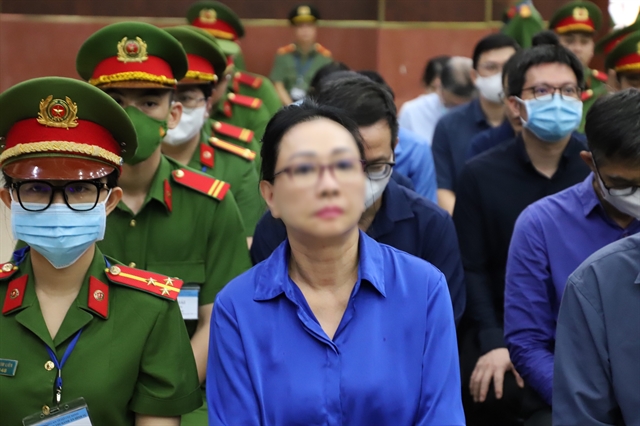 Politics & Law
Politics & Law

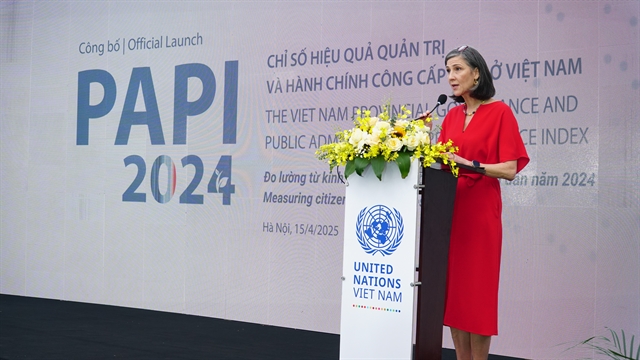 |
| Ramla Khalidi, Resident Representative of the United Nations Development Programme (UNDP) in Việt Nam delivers a speech at the launch event of the 2024 Việt Nam Provincial Governance and Public Administration Performance Index (PAPI 2024), held on Tuesday in Hà Nội. Photo courtesy of UNDP |
HÀ NỘI — Corruption, poverty and employment issues have emerged as the top concerns among Vietnamese citizens in 2024 regarding national and local governance, public administration and service delivery, with corruption identified as the most pressing issue requiring urgent government attention.
This was highlighted at the launch event of the 2024 Việt Nam Provincial Governance and Public Administration Performance Index (PAPI 2024), held on Tuesday in Hà Nội.
The event was jointly organised by the Department of Foreign Affairs and Trade of Australia, the Embassy of Ireland, and the United Nations Development Programme (UNDP) in Việt Nam.
The 2024 PAPI Report – now in its 16th edition – reflects the perspectives of 18,894 randomly selected respondents nationwide on various aspects of governance, public administration, and public service delivery.
According to the report, 22.58 per cent of respondents cited corruption as the most critical issue that the State should prioritise, an increase of 17 per cent from 2023. This notable rise may be attributed to a series of high-profile corruption trials this year, which have drawn strong public attention to the Government’s intensified anti-corruption campaign.
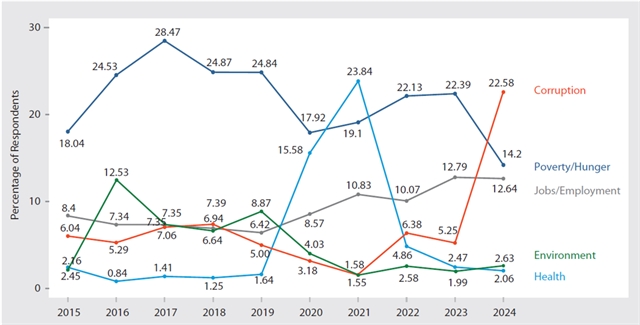 |
| Chart showing a surge in public concern about corruption in PAPI 2024. Courtesy of UNDP |
Interestingly, while public concern about corruption has surged, citizens also reported fewer instances of having to pay informal fees or bribes for public services compared to the previous year. This suggests a positive shift in local-level service delivery, even as broader concerns persist.
The report recommends that government authorities at all levels enhance transparency in public service provision, strengthen law enforcement and ensure protection for whistleblowers, particularly following the recent restructuring of administrative units.
The report highlights notable improvements in household economic conditions compared to 2023. The proportion of survey respondents rating their household’s economic situation as 'poor' or 'very poor' dropped to 10.2 per cent in 2024, the lowest level since 2019.
Despite this progress, poverty remains the second most pressing concern, cited by 14.2 per cent of respondents, followed by employment issues, which 12.64 per cent of respondents believe should be prioritised by the Government.
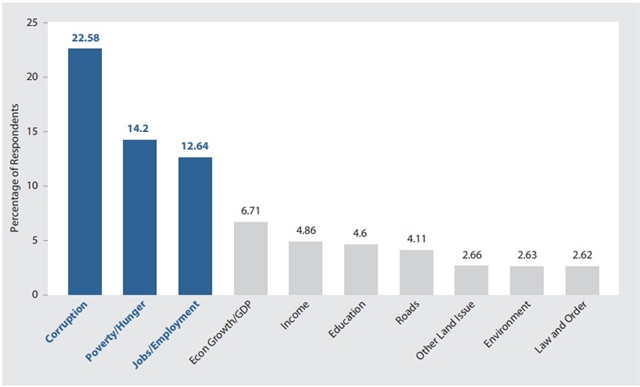 |
| Chart showing the top three priorities emerging from the ten issues of greatest concern to citizens in 2024. |
Việt Nam recorded a GDP growth rate of 7.09 per cent in 2024, yet economic insecurity at the household level, particularly among vulnerable groups, remains a significant issue. The report underscores a strong correlation between perceptions of household economic well-being and access to social insurance.
“Social insurance coverage in Việt Nam is expanding, but it still remains limited,” said Deirdre Ní Fhallúin, Irish Ambassador to Việt Nam.
“The 2024 PAPI survey shows that only 29 per cent of respondents are covered by social insurance, with much lower rates among agricultural workers, informal sector employees and ethnic minorities. Expanding coverage under the 2024 Social Insurance Law will help address citizens' concerns about poverty and economic instability.”
The report also emphasises the impact of climate-related disasters on people’s economic outlook. Nearly 40 per cent of respondents reported that their households or communities were directly affected by extreme weather events over the past year, reflecting growing public vulnerability as climate change intensifies.
To address this, the report calls for strengthening disaster preparedness, investing in resilient infrastructure and tailoring climate response strategies to the specific needs of local communities, especially in vulnerable and hard-to-reach areas, to enhance long-term resilience.
The 2024 PAPI also shows encouraging progress made by local governments in several areas of governance and public service delivery.
Despite important progress, there remains significant room for further improvement in overall public governance in Việt Nam.
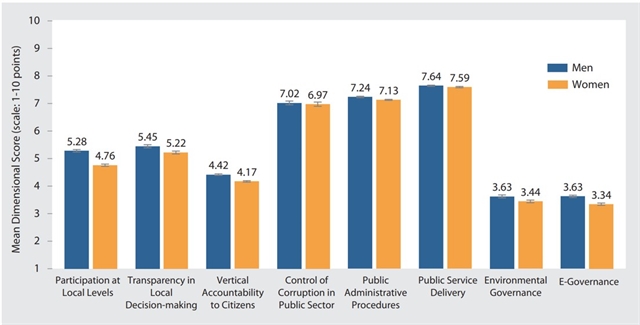 |
| Chart showing that women perceived governance and public administration performance more negatively. |
The findings reveal gaps in citizen satisfaction across different demographic groups. Women, ethnic minorities, temporary residents and people living in rural or remote areas, reported lower levels of satisfaction with local governance and public services compared to other groups.
While digital governance in Việt Nam has made significant progress nationwide, disparities remain, particularly in access to the internet and digital public services among different gender groups, between Kinh and ethnic minority communities and across urban and rural areas.
“Findings from the 2024 PAPI survey highlight both the urgent need and tremendous opportunity to promote gender equality, social inclusion and equitable access to public services through ongoing governance reforms in 2025,” said Ramla Khalidi, Resident Representative of the United Nations Development Programme (UNDP) in Việt Nam.
“These insights pave the way for an evidence-based, people-centred approach to governance reform that ensures current and future initiatives bring tangible benefits to all Vietnamese citizens.”
According to experts, as Việt Nam embarks on a historic reform of its public administration system, including the rollout of a two-tier Government model and the restructuring of provincial-level administrative units, this moment presents a crucial opportunity to enhance inclusive governance and improve the effectiveness and efficiency of policy implementation in response to citizen feedback captured through the PAPI Index. VNS




